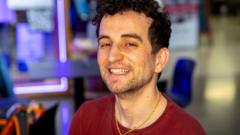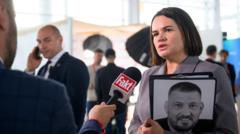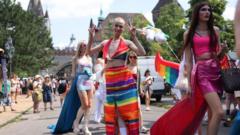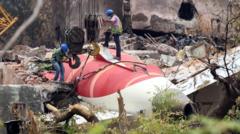With the fall of Bashar al-Assad, survivors René and Nujeen reflect on their painful pasts while expressing a newfound hope for a diverse and tolerant Syria. Both have unique stories of survival, resilience, and a vision for a brighter future despite the lingering uncertainty in their homeland.
From Fear to Hope: Syrian Survivors Speak Out After Assad's Fall

From Fear to Hope: Syrian Survivors Speak Out After Assad's Fall
René and Nujeen share their experiences and aspirations in a post-Assad Syria, reflecting on trauma and the dream of a peaceful future.
René carefully opens the small music box that belonged to his grandmother, letting the sweet melody transport him to cherished memories of his childhood home in Damascus. Now living in the aftermath of Bashar al-Assad’s regime, he feels a mixture of joy and heartbreak. "This is all I have left of my home," he admits, as he navigates through emotions that swing sharply between nostalgia and trauma.
René Shevan, a gentle young man, speaks softly but with strength. He recalls not just his own harrowing experiences in Syrian prisons but the plight of countless others. “I saw a woman pleading in the corner,” he remembers, “and I can still picture a boy being raped, calling for his mother.” It was twelve years since he managed to escape Syria after being detained for attending a pro-democracy demonstration, where the secret police discovered his sexual orientation.
In 2012, René faced horrific gang rape by three officers. “Nobody heard me. I was alone,” he recalled, recounting the shameful laughter that followed his pleas for mercy. Today, however, as he watches images of freed prisoners on television, he recognizes his own growth. “I’m not in prison now, I'm here. I am no longer afraid to show my face,” he says, empowered by the notion that “the republic of fear is gone.”
The impact of these moments reverberates through his mind, but he expresses pride in his identity as a Syrian and part of the global LGBT community, despite the ongoing challenges. He understands that while Assad’s fall is a source of hope, the new regime may also pose risks to his community.
Meanwhile, across Europe, Syrian refugees are processing the political shift. Nujeen, a resilient Kurdish woman who fled Syria during the war, also reflects on the complexities of returning to her homeland. “With Assad gone, we thought change would come, but the real challenge begins now,” she emphasizes. Having faced immense struggles, she highlights the need for a Syria that embraces diversity and acceptance for all ethnicities and sexual orientations.
Both René and Nujeen hold onto a vision for a future free from the shadows of dictatorship—a Syria grounded in love, acceptance, and peace. But as the changes unfold, a sense of uncertainty lingers regarding the fate of their communities, especially for marginalized groups like the LGBT community and ethnic Kurds.
These powerful narratives intertwine resilience and a hope for justice. As they contemplate the past and present, both survivors assert their belief in a future where everyone can live freely, encouraging others affected by the war to dream of a better tomorrow. “We can and will be a better nation,” Nujeen insists, confident that the heart of the Syrian people will ultimately guide them towards healing and unity.






















